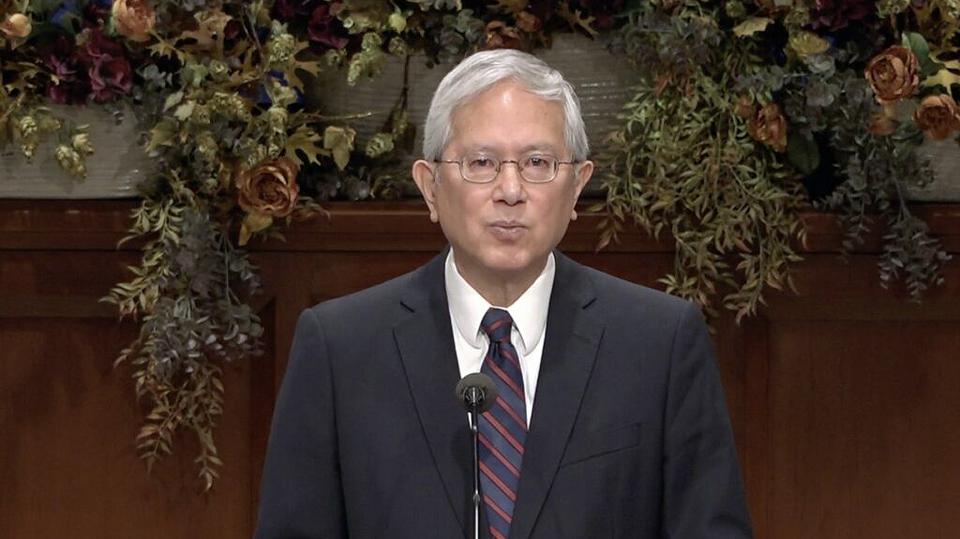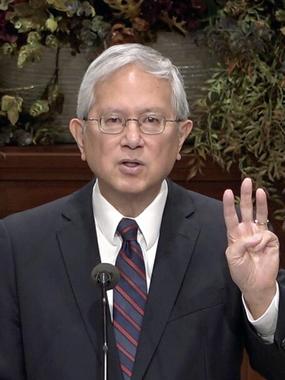
Gong BYU-Idaho devo
Elder Gerrit W. Gong of the Quorum of the Twelve Apostles speaks during a broadcast to BYU-Idaho students for the weekly campus devotional on October 20, 2020. Screenshot courtesy of Church News.All rights reserved.This story appears here courtesy of TheChurchNews.com. It is not for use by other media.
By Rachel Sterzer Gibson, Church News
Years ago, Elder Gerrit W. Gong’s flight was delayed at the Orlando, Florida, airport. In the airline lounge, he began to chat with a couple, who were not members of The Church of Jesus Christ of Latter-day Saints, about their two sons.
When he learned their oldest son was in military training in North Carolina, Elder Gong mentioned he had once lectured at Fort Bragg in North Carolina and, while there, learned about high-altitude/low-opening (HALO) parachute training.
When Elder Gong asked about their second son, he found out he was preparing to play Jean Valjean in a musical production of “Les Misérables.”
Elder Gong then shared his love for the story, the character of Jean Valjean, and the musical. He gave them his card and invited them to a Tabernacle Choir performance when they were in Salt Lake City. They later sent him a note and a “Les Misérables” DVD.
That “laser-personalized conversation,” which brought together HALO parachuting and a musical based on Victor Hugo’s “Les Misérables,” is an example of how the Lord helps individuals learn, grow and serve in ways that meet later needs and opportunities, Elder Gong of the Quorum of the Twelve Apostles told BYU-Idaho students during the weekly campus weekly devotional on Tuesday, October 20.

Gong BYU-Idaho devo
Pararescuemen from the 38th Rescue Squadron and the 58th Rescue Squadron, Nellis Air Force Base, Nev., jump from a HC-130P/N for a High Altitude Low Opening free fall drop from 12,999 feet in support of Operation Enduring Freedom. U.S. Air Force Photo by Staff Sgt. Jeremy T. Lock.All rights reserved.“It is almost as though the Lord is saying, ‘Gerrit, pay attention here. This is an opportunity to learn something you will need five years from now, to talk with someone I will want you to meet.’”
Since then, Elder Gong has wondered, “Can everything we learn become part of our personal storehouse of spiritual experience? Inspired by the Holy Ghost, which can bring all things to our remembrance, can we and the Lord draw upon our personal spiritual experiences to serve those around us in uniquely personalized ways?”
Elder Gong then outlined principles of learning and teaching that can help students in a new school year during the COVID-19 pandemic.
The Apostle addressed the Rexburg, Idaho, campus in his first assignment since recovering from a COVID-19 diagnosis shortly after the 190th Semiannual General Conference.
In his remarks, Elder Gong testified that each BYU–Idaho student is “a loved son or daughter of our Heavenly Father, with divine capacity to learn and teach, grow through experience, and find enduring joy.”
“The glory of God is intelligence” (Doctrine and Covenants 93:36) and “whatever principle of intelligence we attain unto in this life, it will rise with us in the resurrection” (Doctrine and Covenants 130:18-19), so, Elder Gong said, they are not just students at BYU-Idaho but also lifelong, eternal learners and teachers as disciples of Jesus Christ.
Quoting President Russell M. Nelson, who said, “Education is the difference between wishing you could help other people and being able to help them,” Elder Gong asked listeners to “please pay attention in your general education classes, your major classes, your quorum classes and family home evening lessons, Sunday School and other places. You will need and use them all. …
“As lifelong learners and teachers, all we learn in every place and circumstance can be a blessing as we reach out to others — perhaps even at an airport in Florida.”
Elder Gong listed five student leadership and learning principles:
1. We learn by study and by faith.
Elder Gong shared Doctrine and Covenants 8:2-3, “I will tell you in your mind and in your heart, by the Holy Ghost. … Now, behold, this is the spirit of revelation.”
The spirit and body make up the soul, so it is no wonder that purity of both body and mind are essential to clear channels of spiritual communication, Elder Gong said. “Personal worthiness, moral character and our consistent best efforts are part of our eternal, educational model — where ‘true teaching is done by and with the Spirit of the Holy Ghost.’”
2. We act rather than being acted upon.
BYU–Idaho students know learning comes because they seek it, are open to it and desire it, Elder Gong said. “As BYU–Idaho students, we act in our learning. We are not waiting to be acted upon.”
The Lord says, “It is not meet that I should command in all things; for he that is compelled in all things, the same is a slothful and not a wise [student]” (Doctrine and Covenants 58:26).
3. We take responsibility to innovate and improve.
Continuing to reference Section 58 of the Doctrine and Covenants, Elder Gong said, “[Each student] should be anxiously engaged in a good cause, and do many things of their own free will, and bring to pass much righteousness; For the power is in [each student], wherein they are agents unto themselves. And inasmuch as [each student does] good [he or she] shall in nowise lose their reward.”

Gong BYU-Idaho devo
Elder Gerrit W. Gong of the Quorum of the Twelve Apostles speaks during a broadcast to BYU-Idaho students for the weekly campus devotional on October 20, 2020. Screenshot courtesy of Church News.All rights reserved.When Elder Gong was a YSA stake president, he noticed three small daily practices that helped apartments have greater unity. He invited students to make time as roommates to: first, kneel and pray together; second, periodically eat together — “Talk and laugh as you do so,” the Apostle advised; and third, keep a current copy of the “Ensign” (soon to be “Liahona”) in an open place in the apartment.
“Would you like greater peace, harmony, unity in your apartment and in your life? Better focus and better grades? A temple-like spiritual feel where you live?” he asked. “If so, please nurture a living environment that invites the Spirit and makes you smile as you take care of each other.”
4. We teach in order to learn.
“What we give away comes to us in greater measure,” Elder Gong said. But the benefits come not in simply giving something away but as individuals establishing a covenant, caring relationship between giver and receiver, between learner and teacher.
To those who are dating and wondering if they have found an eternal partner, Elder Gong said, “Watch what makes them laugh. What makes someone laugh says much about who they really are. Choose someone who will help you laugh — in joyous, genuinely happy, kind and generous ways — for eternity.”
5. We build those around us.
When Elder Gong taught at BYU, his class discussed the characteristics of great learners described by President Henry B. Eyring: “Great learners welcome correction, great learners keep commitments, great learners work hard, great learners help other people, and great learners expect resistance and overcome it.”
Students at BYU–Idaho know they are part of something miraculous — the establishment of a university as a temple of learning located next to a house of the Lord.
“Think of it,” Elder Gong said. “In all the world, there are only three places where we find a house of the Lord, a Brigham Young University campus, and a learning and serving community dedicated to living the standards of the Lord’s house and Brigham Young University.”
The prophecy pronounced by President Eyring that “graduates of BYU–Idaho will become legendary for their capacity to build the people around them and to add value wherever they serve” is both an invitation and a challenge, each day.
“Please remember there are no limits to what faith can bring,” Elder Gong said, “and hence, no limits to how fast or how deep or how many students can ultimately be blessed, on and off a physical campus.”
He closed with a blessing: “May this 2020 and 2021 school year include health, peace and deepening conversion. I humbly pray you will find great delight in your hopes and accomplishments, that you’ll grow through your challenges and find rich fulfillment of your righteous desires and your most joy-filled dreams.”
Copyright 2020 Deseret News Publishing Company